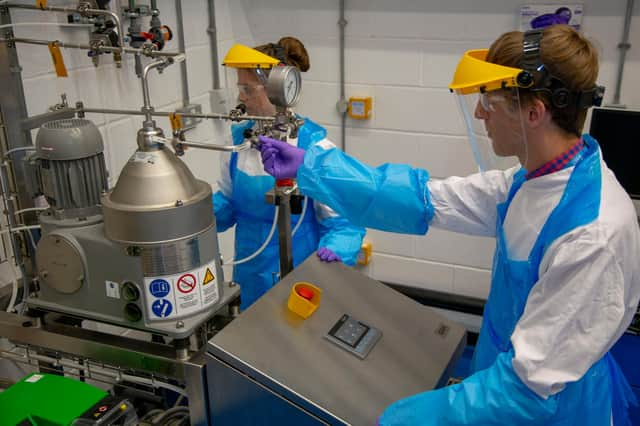Scotland’s chance to grow a new clean, economy - comment


The key promise of a bio-based economy is that we can grow the sources of raw materials for everyday products. Industrial biotechnology (IB) is one of the many faces of innovation in the life sciences world. IB offers sustainable, scalable solutions to the current environmental challenges facing many industries.
Industrial Biotechnology Innovation Centre (IBioIC) has more than 120 member organisations, working across Scotland, the rest of the UK and Europe to find innovative solutions to modern problems. Our industry members range from medical biotechnology companies working on protein production through to those developing green solutions in bioenergy and biofuel, that utilise agriculture, marine and forestry derived materials.


Advertisement
Hide AdAdvertisement
Hide AdThe projects IBioIC helps to deliver are as diverse as taking waste from shellfish and using it to develop sustainable, biodegradable packaging, to fermenting sugar in bioprocesses for the production of high value products like pharmaceuticals and sustainable materials. Our purpose goes beyond growing the bioeconomy, it is our role to raise awareness of the benefits of transitioning to this sustainable, cleaner future.
The move away from using petrochemicals as the main source of our energy and chemicals is something we must do to meet the ambitious net zero carbon targets in Scotland by 2045 and 2050 in the UK. For this to be economically viable and attractive in the short term, there must be proactive and supportive government policy to propel industry towards solutions provided by the bio-based industries.
Repurposing traditional “waste products” is another great use of IB. Some of our members have developed technology that can repurpose waste from industrial and agricultural processes. The sources and uses are wide-ranging, the likes of salmon feed can be made from algae grown on whisky co-products. One industry’s waste is another industry’s gold.
This approach contributes to growth of a circular economy. Security of supply is something that as a nation we have recently had a crash course in, or the lack thereof. Supply chains are complex and spread across different nations: some sectors heavily rely on the ability to import goods and services.
Support
Reshoring significant parts of supply chains is something that IB can also support. Scotland imports more than 50 million litres of ethanol annually, for example, to blend into petrol, reducing its carbon footprint. Post-pandemic, we need to build security into key supply chains. We can grow the crops, convert the sugar they contain, and ferment that sugar into ethanol all within 30 miles of the heart of Scotland’s chemical industry in Grangemouth.
A significant sugar supply is the foundation of a bio-based manufacturing cluster in Scotland. We can future-proof our manufacturing industries as part of the post-Covid-19 green recovery by embracing scalable biotechnology. IBioIC has worked to build a carefully cultivated network that unites government, industry and academia.
We are working with them to reintroduce sugar beet to Scotland, providing a local and reliable source of raw materials that can be converted in biorefineries to sugar, and then processed into many other materials we need such as ethanol, polymers or even therapeutic proteins. However, difficulty for firms often arises in the jump from research and development to manufacturing.
If we are going to grow our industry and meet environmental targets, we must go beyond supporting innovation and development, and incentivise firms to transition to manufacturing through supporting investment in manufacturing infrastructure.
Advertisement
Hide AdAdvertisement
Hide AdWith the right framework, policy and funding environment, we can build a successful bio-based economy that will provide solutions for our clean, low carbon agenda. IB has a lot to offer in creating a sustainable bioeconomy equipped for the future, and innovation is key.
Mark Bustard is CEO at IBioIC
A message from the Editor:
Thank you for reading this story on our website. While I have your attention, I also have an important request to make of you.
The dramatic events of 2020 are having a major impact on many of our advertisers - and consequently the revenue we receive. We are now more reliant than ever on you taking out a digital subscription to support our journalism.
Subscribe to scotsman.com and enjoy unlimited access to Scottish news and information online and on our app. Visit https://www.scotsman.com/subscriptions now to sign up. By supporting us, we are able to support you in providing trusted, fact-checked content for this website.
Joy Yates
Editorial Director
Comments
Want to join the conversation? Please or to comment on this article.